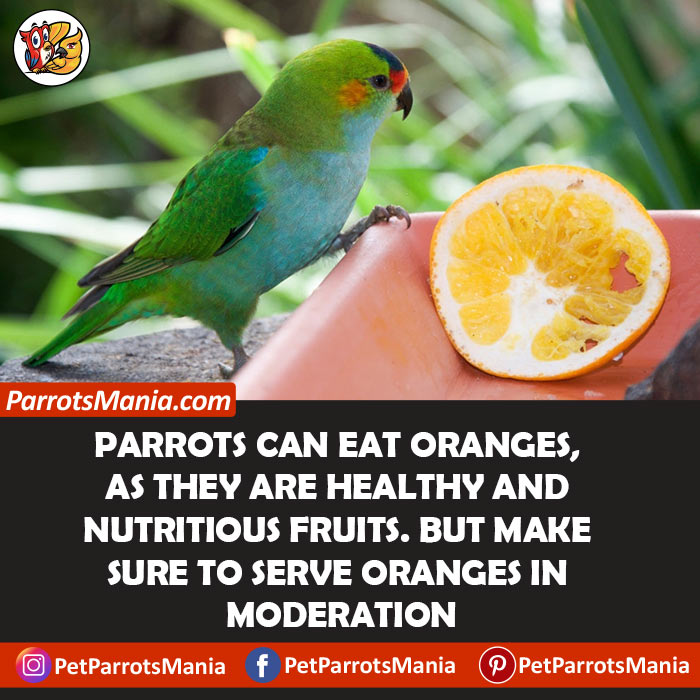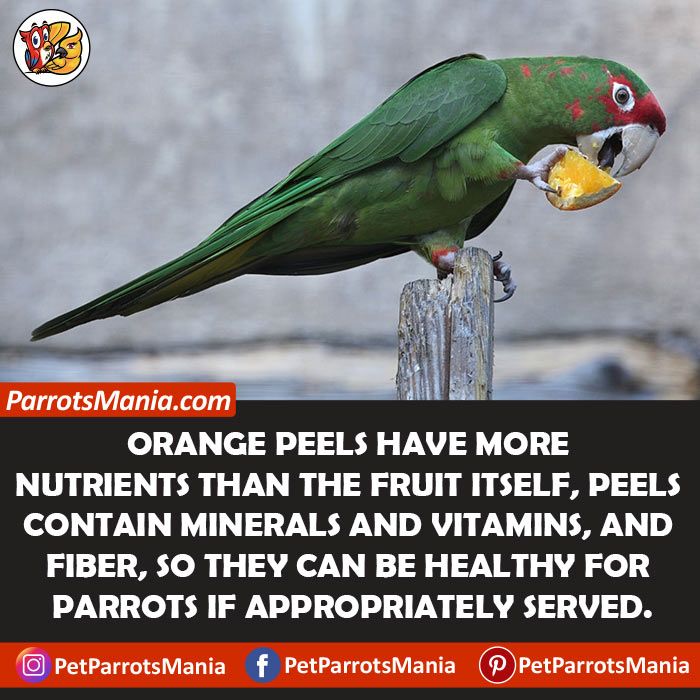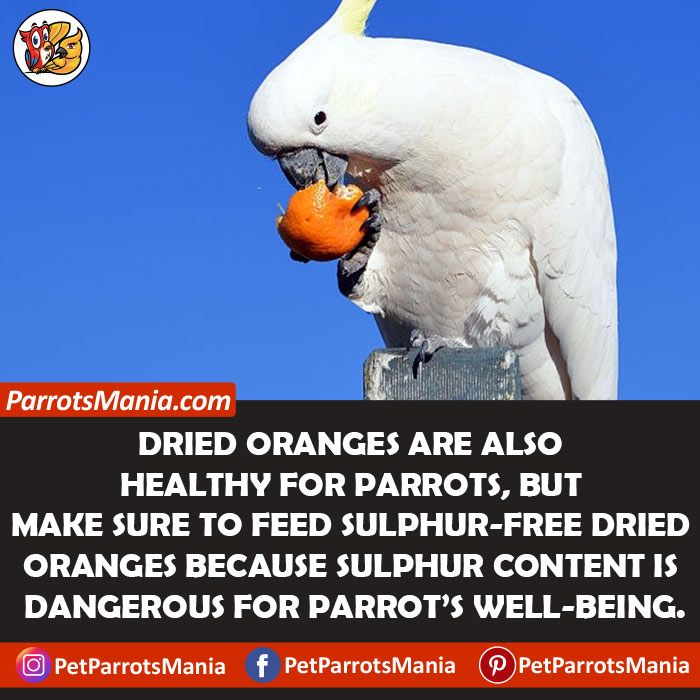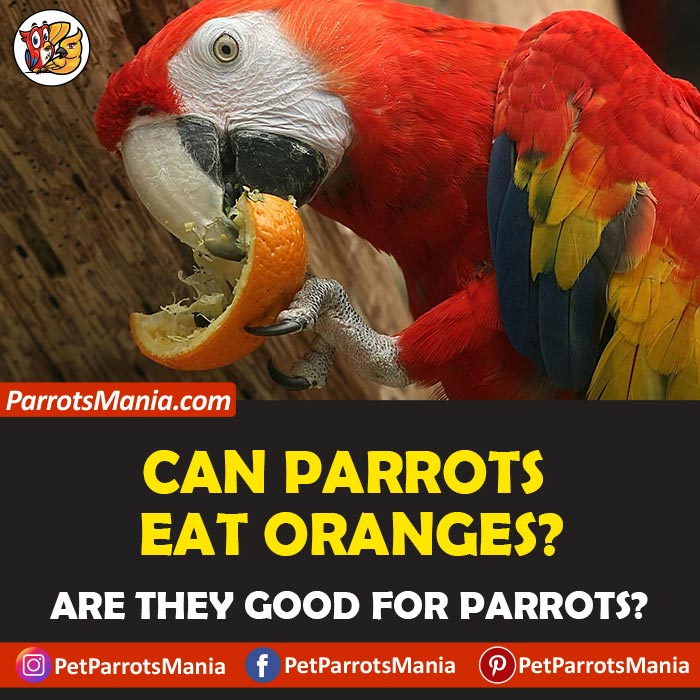Last Updated on November 26, 2022
Parrots eat healthy fruits, vegetables and seeds in the wild. While in captivity, they used to eat what their owners offered. You might be wondering whether parrots can eat oranges or not. Can parrots eat oranges? Are they healthy for parrots or not?
Parrots can eat oranges, as they are healthy and nutritious fruits. But make sure to serve oranges in moderation because oranges are acidic fruits so an excess amount can disturb the parrot’s health. Besides this, you can add oranges to the parrot’s diet without fear.
Oranges are healthy and safe for parrots, but is it enough to know? While serving oranges to parrots, you need to know how to feed oranges to parrots. How often can you serve oranges? What are the edible and non-edible parts of oranges? Do oranges hold some side effects? And what are the nutritional benefits of oranges? Let’s start the discussion.
Oranges Are Safe For Parrots
Oranges are enriched with multiple nutrients and are a power pack of vitamins and minerals. Parrots like to eat oranges because of their tangy, juicy, delicious flavour. You might want to know which parts of the orange are safe and healthy for parrots.

- Orange peel is delicious and healthy to consume because of vitamins and minerals.
- Parrots eat orange pulp/segment because of its juicy flavour.
- Orange seeds are edible and nutritious and do not harm parrots.
- Orange juice is the best natural beverage for parrot diets.
- Dried oranges are also safe to consume.
The whole orange is edible, but you should know the right method to serve these edible parts of the oranges to parrots for maximum health benefits.
How To Serve Oranges To Parrots?
Most nutritional experts consider oranges as superfruits for the parrot’s physical appearance. You can serve oranges to parrots in many ways; you can cut oranges into cubic slices, hand-feed oranges pieces, and provide whole or half oranges depending on your parrot’s age and size so that they can eat on their own.
You can also serve orange peels, dried oranges, and orange juice. But there are things you need to consider while serving oranges to parrots. Such as:
- Make sure to wash oranges properly before serving.
- You can add oranges to the parrot’s diet.
- Make sure to feed fresh and clean oranges.
- Make sure to provide Sulfur Free Dried oranges.
It is better to offer oranges according to these precautions to ensure a healthy intake of oranges for parrots.
How To Serve Orange Peels?
Orange peels appeal to parrots; most like to eat orange peels. They are healthy for parrots’ body functioning and great for their digestive systems. Orange peels have more nutrients than the fruit itself, peels contain minerals, vitamins, and fibre, so they can be healthy for parrots if appropriately served.
Because you can’t ignore that orange peels contain traces of pesticides, other insects drooping, and dirt. So, it can be dangerous for parrots. However, you can serve the oranges to your parrot in this way.

- Wash them properly with a pesticide removal solution. OR
- You can also soak orange peels in a hot water solution with vinegar for more than 20 minutes, and after that, make sure to rewash them.
- You can also serve organic orange peels to parrots, which are safe for parrot consumption.
How To Serve Orange Juice?
If you are interested in serving your parrot, you can dilute orange juice to the parrot’s diet, but make sure to feed it in limited small portions because of its acidic properties.
You can’t feed stored-packed orange juice to parrots, as they contain a high sugar content and some preservatives. So it can be harmful to the parrot’s health. So always serve homemade orange juice to parrots.
How To Serve Orange Seeds?
Parrots can or can’t eat orange seeds, depending on their taste and preferences. So if they don’t like it, then avoid feeding them.
Sometimes, orange seeds can choke the parrots and get into the parrots’ guts. So, it can be disturbing for parrots or cause indigestion. Other than this, there is nothing terrible about feeding orange seeds to parrots, and they are also enriched with nutrients and rich in antioxidants.
It helps to keep parrots hydrated and improve their overall health. But make sure to feed in moderation; you can also soak orange seeds overnight before feeding to parrots.
How To serve Orange Leaves?
You can feed orange leaves to parrots, as they don’t contain any harmful toxins, but there can be the risk of pesticide traces, dirt, and other toxins in orange leaves. So, if you want to feed them to parrots, follow these instructions.
- Wash them properly with a pesticide removal solution.
- Or you can soak them in hot vinegar-diluted water for almost 15-20 minutes.
They are bitter but used for their sedative properties. Bitter orange leaves are recommended against hacking cough, nervous stomach cramps, and other diseases. You can also use orange leaves to cure parrots’ diseases.
How To Serve Dried Oranges?
Dried oranges are also healthy for parrots, but ensure to feed sulfur-free dried oranges because sulfur content can act as a preservative and is dangerous for parrots’ well-being.
- You can feed homemade dried orange fruits to parrots. It’s effortless to make and is free from all preservatives.
- Store oranges pieces under sunlight for 3-5 days, depending on the temperature of your place.
- Sundried oranges are a healthy alternative to market-packed dried oranges.

Here I will discuss how often you can serve oranges to parrots so that you can appropriately serve oranges to parrots without difficulty.
How Often Can Parrots Eat Oranges?
Oranges are beneficial and safe for parrots as they provide multiple nutrients. But you may be familiar that excess consumption of healthy nutrients can also change into adverse effects.
Just because of acidity, you have to limit orange consumption to parrots.
- You can feed one or two slices of oranges at once regularly. But don’t exceed the orange portion, then two pieces.
- Serve half or full oranges after four days a week. Parrots love to pierce and find out the inner juicy vesicles of oranges.
- The best time to serve oranges to parrots is in winter, as they can benefit from oranges.
Nutritional Benefits Of Oranges To Parrots:
There are many nutritional benefits of oranges, as oranges are rich sources of fibre, vitamins, minerals and antioxidants. So a healthy portion of oranges can lead to many benefits for parrots, such as:
- Boost immune system:
- Protect parrots cells from damage.
- Beneficial for skin and feathers.
- Absorb excess Iron to fight Anaemia.
- Control parrots blood pressure.
- Antioxidants.
All of these benefits depend on your serving portion, so make sure to serve appropriately to ensure all the health benefits for your feathery pet.
Side Effects Of Oranges On Parrots:
As I mentioned earlier, there will be no side effects if you serve appropriately, but excessive consumption can lead to some severe consequences, such as:
High Acidity Level: Oranges are an acidic fruit; they are not harmful if a limited feed-in portion and can lead to adverse effects if served inappropriately.
Overconsumption is harmful: Overconsumption can lead to issues such as itching, allergic reactions, nausea, vomiting, mouth irritation, and stomach ache.
Pesticides: Orange’s outer surface contains pesticide traces that can harm the parrot’s health and lead to different diseases.
Too Many Preservatives: Packed oranges, orange juice, seeds, and peels have many preservatives; they can also disturb a parrot’s health. So make sure to feed fresh homemade oranges.
Conclusion:
Oranges are enriched with multi nutrients and are helpful for parrot’s health. Along with benefits, parrots also like to eat delicious, juicy, sweet, and sour oranges as they are a natural alternative. But you should add them in moderation.
Besides this, I have discussed important things related to oranges in this article, so it can be beneficial for you to learn the proper portion and serving method of oranges to parrots. You can ask any other things if you want to know about oranges for parrots; I will make sure to clear all your queries.
Also Read About: Can Parrots Eat Cherries?

